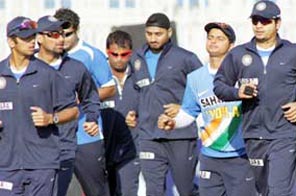India stars embroiled in WADA doping demand
NEW DELHI: India's cricket chiefs will meet in an emergency session on Sunday after leading players refused to sign an anti-doping code, saying it infringed their privacy.
International Cricket Council officials will brief the Indian board's meeting in Mumbai to clear doubts about the World Anti-Doping Agency (WADA) code, which players were expected to sign by August 1.
Indian players are unhappy at a clause that requires them to detail their whereabouts for an hour between 6:00 am and 11:00 pm everyday for the next three months to allow random out-of-competition testing.
The players, who declined to be named, said they regarded the clause as impractical and had informed the Indian officials of their reluctance to sign the code months ago.
"None of us would sign," local media quoted an unnamed player as saying on Friday.
"It will be like giving the WADA a camera to constantly monitor what we are doing. We are sportsmen, not criminals. If they so desire, let WADA test us every day when we are competing."
Another player said: "I would not be comfortable at all. Why should they want to track our movements? Are we out on parole or what? I will not allow anyone to intrude on my privacy.
"I am prepared to be tested every day when I am playing in any part of the world. But, when I am not playing, I don't want to be disturbed at all by anyone in the name of an anti-doping rule."
According to WADA rules, anyone missing three doping tests over 18 months faces a ban of up to two years.
There are nine Indian male and two female players who have been registered for dope testing, both during tournaments or random out-of-competition.
The male players in the list are world batting record holder Sachin Tendulkar, captain Mahendra Singh Dhoni, Virender Sehwag, Yuvraj Singh, Harbhajan Singh, Zaheer Khan, Gautam Gambhir, Irfan Pathan and Munaf Patel.
Jhulan Goswami and Mithali Raj are the two women players in the list.
ICC chief executive Haroon Lorgat told the Cricinfo website that an "overwhelming majority" of players from all countries, except India, had submitted information about their whereabouts.
"I understand and appreciate that there will be some concerns and reservations from all players and I am sure they feel that those concerns are genuine," Lorgat said.
"However, the ICC has spent the past few months addressing all of those concerns, and, having taken great care to do so, we see no further reason to delay the full implementation of the requirements specified by the WADA code.
"WADA's whereabouts system was developed after months of consultation and by adopting the same, we hope to ensure that our sport remains fair and clean.
"We will seek to remind the Indian cricket board of this point when we meet with it on Sunday."
Lorgat said the ICC was keen to find a "pragmatic solution" to the stalemate.
"If we think that there are things that need to change in the system, we will provide feedback to WADA in the course of our wider review of the international pool," he said.
"There are a number of ways of ensuring compliance with the requirements. For instance, the players need not necessarily submit all of the information themselves.
"The national board can appoint an administrative official who can help to manage the process. All that the ICC is striving for is the most pragmatic solution."






